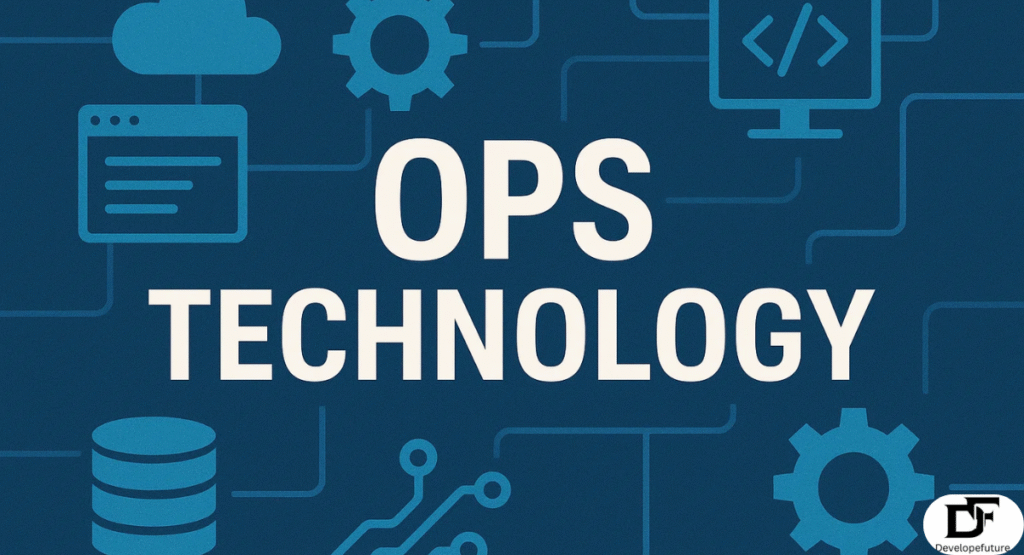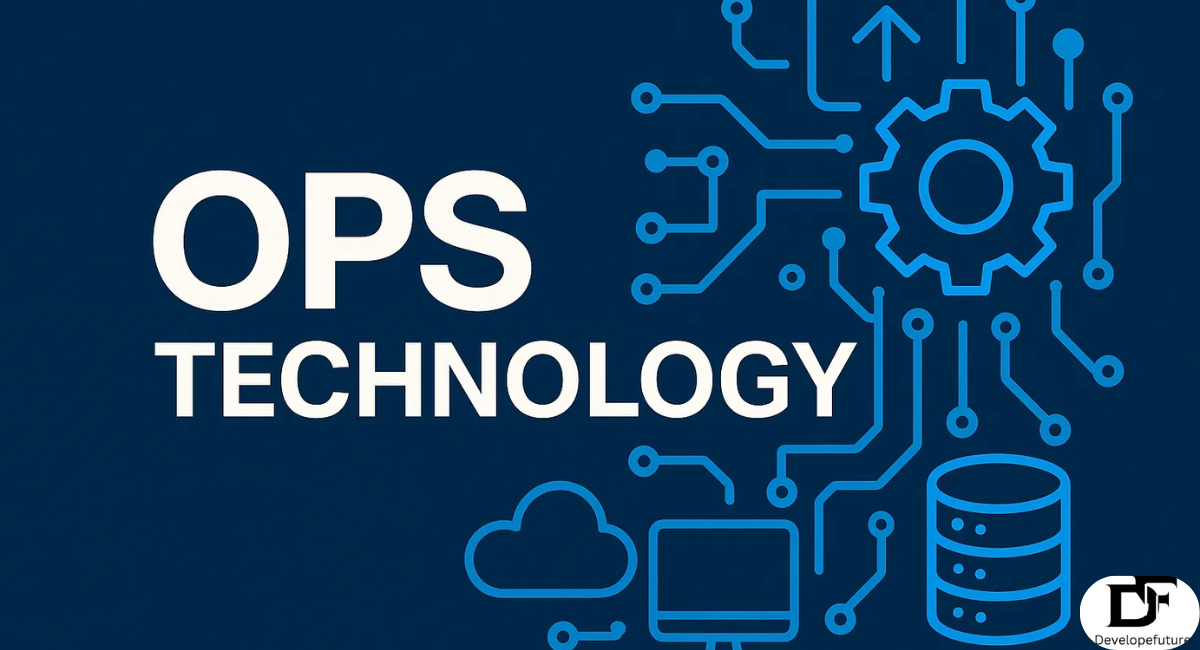In today’s rapidly evolving digital landscape. Businesses are constantly looking for ways to streamline operations. It enhances efficiency and remains competitive. One of the key enablers of this transformation is Ops Technology. Often referred to as “Ops Tech.” This term encompasses the systems, tools, and strategies. It’s used to improve, automate, and optimize operational processes. From IT operations and DevOps to business operations and process automation. This technology plays a central role in bridging technology with day-to-day functions.
Ops Technology isn’t about implementing new software or tools. It’s about rethinking. How operations can be managed smarter, faster, and with fewer manual errors. It integrates automation, artificial intelligence, machine learning, and cloud computing. In business functions, enabling organizations to stay agile and responsive. This shift has been redefined. How industries work in finance. And also healthcare to logistics, and retail, manage their core operations.
Ops Technology is crucial. Because it directly impacts how businesses deliver value to customers. Whether through smoother workflows, improved data insights. For faster decision-making, technology has become the backbone of modern enterprises. Let’s explore its meaning, components, applications, and future.
Table of Contents
Defining Ops Technology
Ops Technology refers to the technological solutions and frameworks designed. It optimizes operational processes across different business domains. It is not confined to a single function. But spans across IT operations (ITOps). The development operations (DevOps), marketing operations (MarOps), sales operations (SalesOps), and more. Essentially, any operational area that leverages technology to improve performance. It can be considered part of this Technology.
The ultimate goal of this Technology is to reduce inefficiencies. Also automate repetitive tasks, and provide better visibility into operations. By doing so, organizations can scale faster. It reduces costs, and improves service delivery. Ops Tech solutions can range from workflow automation platforms. And monitoring tools to advanced analytics systems that provide real-time insights.

Key Components of Ops Technology
- Automation Tools Automation lies at the heart of Ops Technology. By automating repetitive and time-consuming tasks, businesses save resources while ensuring consistency. Tools like robotic process automation (RPA), CI/CD pipelines, and automated ticketing systems are examples.
- Data Analytics and Insights Ops Technology relies heavily on data-driven decisions. Through advanced analytics and business intelligence platforms, organizations can monitor performance, track KPIs, and identify trends for informed strategies.
- Cloud-Based Operations Cloud computing has enabled scalable and flexible operations. Ops Tech often leverages cloud infrastructure to support distributed teams. It manages workloads, and ensures seamless collaboration.
- Monitoring and Incident Management In IT operations, Ops Tech includes monitoring systems. That detects downtime, security breaches, or performance bottlenecks. This allows businesses to respond quickly and reduce disruptions.
- Collaboration Platforms Ops Tech supports teamwork across departments. Integrated communication and project management tools foster collaboration. And it improves transparency in operational workflows.
Types of Ops Technology
Ops Tech comes in various forms, each designed to address a specific aspect of operations. IT Operations (ITOps) focuses on managing servers. Their networks and IT services ensure a smooth technical infrastructure. DevOps bridges development and operations teams to speed up software delivery. With automation and continuous integration. BizOps works at the business level. BizOps aligns strategies with technology to maximize efficiency and performance.
Other variations include FinOps, it helps organizations manage cloud costs and optimize financial operations. and RevOps, which aligns sales, marketing, and customer success teams to boost revenue. PeopleOps supports human resources with recruitment automation, employee data management, and streamlined onboarding. .These variations highlight how Ops Technology adapts to every department in modern organizations.

Comprehensive Analysis of Ops Technology in Property Management
In property management, Ops Tech is transforming how landlords, managers, and real estate companies handle daily operations. Digital platforms help automate rent collection, lease management, and maintenance requests. It significantly reduces manual work. Property managers now use smart systems to track tenant issues. It generates reports and ensures compliance with regulations.
Advanced technologies such as IoT sensors and AI-driven platforms enhance monitoring. Their energy efficiency and security in buildings. Cloud-based solutions provide real-time access to data for both managers and tenants. It fosters transparency and enhances communication. Ops Tech allows property managers to deliver higher-quality services. In contrast, cutting costs and optimizing resources.
Applications of Ops Technology in Business
Ops Tech has widespread applications across industries. It’s making one of the most versatile innovations. In IT, it supports incident management, cloud monitoring, and service automation. In logistics, Ops Tech enhances supply chain visibility. It tracks shipments in real time, and predicts delays with analytics. Retailers use it to streamline inventory management and personalize customer interactions.
Beyond operations, Ops Tech powers finance and HR functions. FinOps ensures better cost control, especially in cloud services. While PeopleOps leverages digital tools for payroll automation and employee experience. Customer support teams also enjoy AI-driven chatbots. Which reduces response times and improves satisfaction. These applications highlight its adaptability to diverse business challenges.

Benefits of Ops Technology
The adoption of Ops Tech brings remarkable efficiency gains. It’s across all levels of an organization. Automation eliminates repetitive tasks. It’s reducing human error and freeing employees to focus on more strategic work. Real-time monitoring tools ensure issues are detected early. It’s lowering downtime and improving reliability.
From a strategic perspective, Ops Technology boosts decision-making by providing actionable insights through analytics and dashboards. Cost savings also emerge as processes become leaner, requiring fewer resources for the same output. Additionally, Ops Tech enables scalability, allowing companies to grow without a proportional increase in operational costs. This combination of benefits makes it an essential part of modern business success.
Challenges in Implementing Ops Technology
Despite its benefits, implementing Ops Tech often presents challenges. Integration with legacy systems can be difficult, especially for companies with outdated infrastructure. High upfront costs for advanced tools also create financial barriers. It’s particularly for small and medium-sized businesses. Another major issue is resistance to change. As employees may fear automation could replace their jobs.
Data security remains a concern as operations become increasingly technology-driven. Cybersecurity threats and compliance requirements demand strict safeguards. Moreover, organizations face a skills gap. As trained professionals capable of handling Ops Tech tools are in high demand. But it’s limited in availability. These challenges must be addressed through training. Also clear its change management strategies, and gradual adoption plans.

Future of Ops Technology
The future of this technology lies in greater automation and AI-driven solutions. With advances in machine learning, predictive analytics will become the norm. Its helping organizations expect problems before they arise. Hyperautomation, which combines multiple automation tools with AI. This redefines how business operations are executed.
Ops Technology will increasingly focus on sustainability. They said that business operations are not only efficient. But also environmentally responsible. Cloud-native Ops Tech, edge computing, and blockchain-based operational systems are also expected. They gain traction in the coming years.
FAQ’s
What does this technology mean in simple terms?
This Technology refers to the use of modern tools. And systems to optimize, automate, and manage business operations efficiently.
How is this technology different from DevOps?
DevOps is a subset of Ops Technology. It’s focusing on software development and IT operations. Whereas this Technology covers many business functions.
What industries use Ops Technology?
Almost every industry—finance, healthcare, retail, logistics, IT, and manufacturing—utilizes this technology. The streamlined processes and reduce inefficiencies.
What are examples of Ops Technology tools?
Examples include ServiceNow, Jira, Jenkins, GitHub Actions, Slack, and RPA platforms.
What is the future scope of Ops Technology?
The future lies in AI-driven automation, predictive analytics, hyperautomation, and sustainability-focused operational systems.
Conclusion
Ops Technology is more than a buzzword. It is a strategic enabler for modern organizations. By blending automation, analytics, and collaboration. It helps businesses streamline processes, reduce costs, and improve service delivery. From IT and DevOps to finance and HR, every operational domain can leverage Ops Tech to achieve better outcomes.
As organizations continue to face challenges in scalability, efficiency, and competitiveness. This technology will remain a cornerstone of transformation. The businesses that embrace it early. And strategically are the ones that will thrive in the digital-first future.




